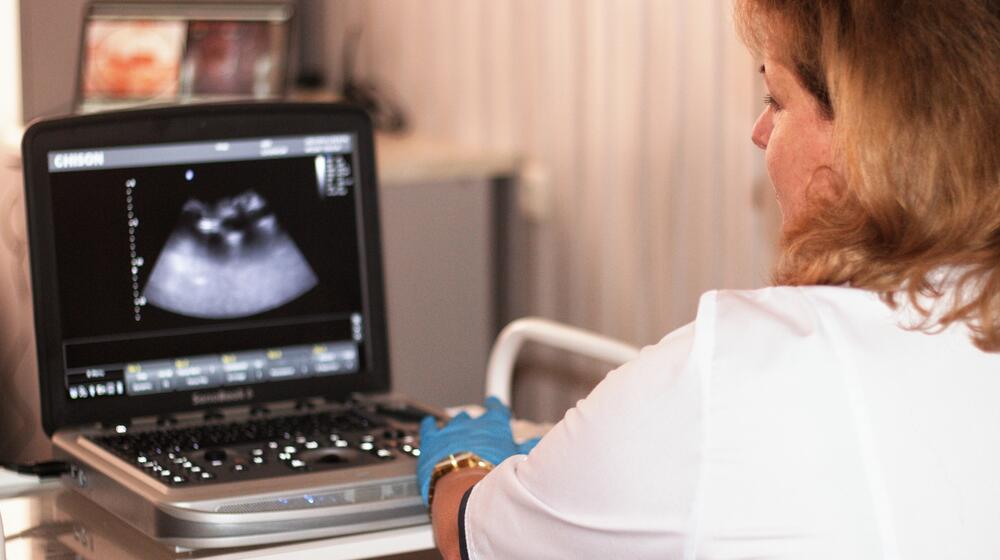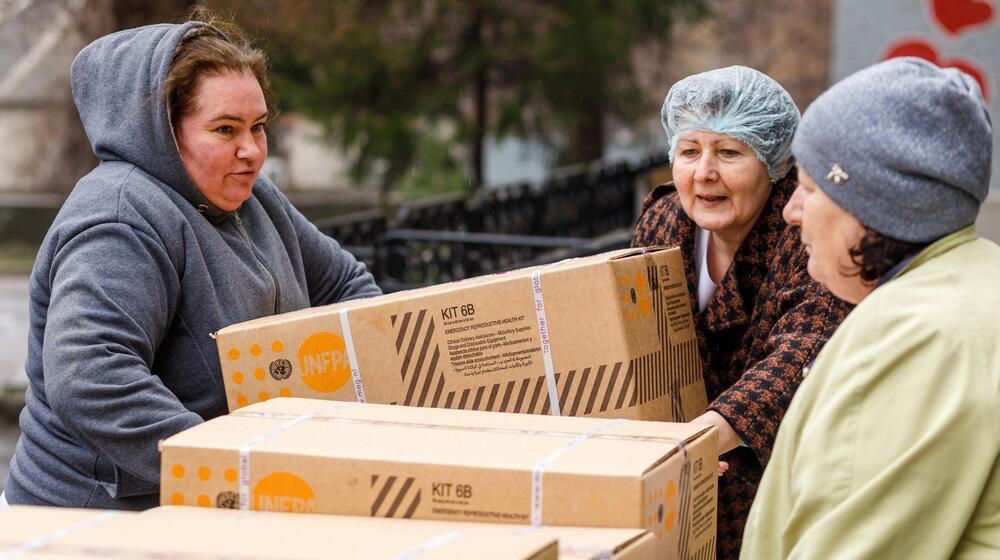News
A year on from Russia’s full-scale invasion in Ukraine, tackling the onslaught on health and rights for generations of women and girls
- 24 February 2023
News
UKRAINE – “All of this reminds us that life continues, even during war.” Tetyana Postolovska, an obstetrician and gynaecologist, works in a UNFPA mobile reproductive health clinics in Vinnytsia, a transit region in Ukraine.
From babies delivered in active conflict areas, to women suddenly becoming pregnant when they thought they were infertile, she has seen her share of joy amid despair – but also of trauma and tragedy.
“About 185,000 internally displaced people have passed through here since the beginning of the war – 113,000 of them women,” explained Dr. Postolovska. During the five months she has worked with the mobile team, she has examined some 3,000 women across six districts. “Once we saw 43 people in a day,” she said. “It's not easy, but we can't stop the arrival of patients just because we feel tired. We need to examine everyone.”

The UNFPA clinic is staffed by a gynaecologist, a midwife and a therapist, and stocked with medicine, equipment, contraceptives and tests for sexually transmitted diseases. More than 20 of the mobile clinics operate across the country, delivering family planning services, postnatal and antenatal care, including for obstetric emergencies. In some cases, they are the only lifeline for countless women and girls.
But despite their tireless efforts, Dr. Postolovska said the number of miscarriages in Ukraine has increased by around 10 to 15 per cent compared to the pre-war period. "We need to be as accessible to people as possible… every family [should have the] chance to give birth to a healthy child at the expected time.”
Visible and invisible scars
Russia’s bludgeoning of Ukranian infrastructure, hospitals and health facilities has made it at times impossible for women and girls to access even basic sexual and reproductive health services – let alone life-saving support like Caesarian sections or post-rape kits.
This last year has seen more than 760 attacks on health facilities, and medical staff often lack the supplies and equipment that could mean the difference between life and death for women giving birth in the chaos of war.
The invasion has taken a particularly heavy toll on the lives of millions of women, girls and young people, as gender-based and domestic violence have risen sharply. Some 3.6 million people in Ukraine are estimated to need gender-based violence prevention and response in 2023 – the vast majority of them women and girls. With no means to physically escape, some survivors are forced to stay with or return to their abusers, while the stress caused by the war led tensions to mount at home.
Hanna Tartynskyi is a psychologist from Berdiansk in southeastern Ukraine and works with a UNFPA centre for survivors in Dnipro. She said “Domestic violence has not disappeared. It simply migrated with people. And although at home social services, the police, and neighbours were aware of such families, during mass migration survivors find themselves completely at a loss: Where to turn, where to look for help?”
And while many are still evacuating, others are returning home despite the conflict, desperate to rebuild some semblance of their former, peacetime lives. Among them is psychologist Victoria Semko, who went back to Irpin in April 2022 after the Ukrainian government regained control of the city. She works with one of UNFPA’s 100 psychosocial mobile teams, which initially assist in emergencies and help people to contact the police, social services and safe spaces where they can take refuge.
Now, she added, they are also increasingly dealing with cases of severe emotional depletion. “If in the first months of the war there was stress and a surge of energy, an urge to fight, this was followed by exhaustion and apathy. The first signs of post-traumatic stress disorder are already beginning to appear in some of those affected by the horrors of war.”
With thousands killed and almost one third of Ukrainians forced to flee their homes, the WHO estimates that 10 million people are at high risk of acute stress, anxiety, depression, substance use and post-traumatic stress disorder.

Protecting health, preventing violence
Throughout these last 12 months of brutal conflict, UNFPA has continuously delivered critical reproductive health supplies, medicine and equipment to hospitals and mobile teams to cover the immediate needs of more than 7 million people, including in some of the hardest-to-reach and most dangerous areas.
Of the 195,000 women who gave birth in Ukraine in 2022, almost one third delivered at over 50 maternity facilities supported by UNFPA. UNFPA supports 48 facilities for survivors of violence and women at risk across Ukraine and three crisis hotlines.
But to continue this life-saving work we need safe, unimpeded access to all people in need and the support necessary to urgently scale up health and protection services. Without this, continued violence and violations of rights could cause dangerous ripple effects that will haunt generations of women and girls for decades to come.
UNFPA in Ukraine is seeking $99 million for 2023, to provide critical support to over 11 million people and ensure that women affected by the war, both in Ukraine and in neighbouring countries, can give birth safely and live free from violence, abuse and exploitation.